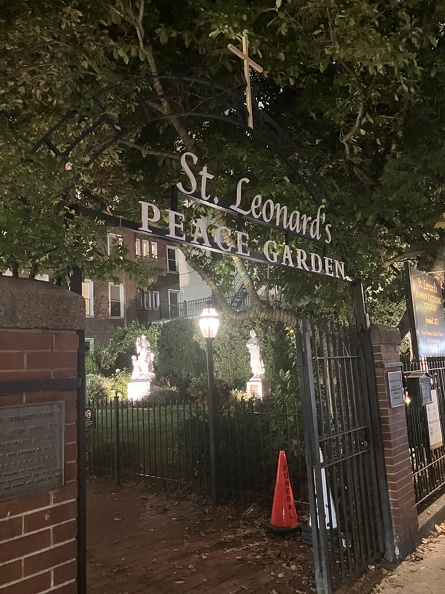On Thursday night, I attended a candlelight vigil for Charlie Kirk. Conservatives, libertarians, and supporters of free speech gathered on the Boston Common to pay tribute to the political activist who was murdered for speaking out about his beliefs. It was heartwarming to be among fellow non-woke people, a rarity in my state of Massachusetts, holding candles as the dusk settled around us on the steps of the State House. The crowd was sufficiently large that it was difficult for me to see or hear the speakers, but I still enjoyed the comforting and welcoming atmosphere. Even though I didn’t know anyone, I didn’t feel uncomfortable or out of place. Unfortunately, the event ended rather abruptly when the police kicked everyone out of the Boston Common, apparently because Antifa had threatened to blow people up.
One positive result of the terrible but unsurprising actions of Antifa was the fact that I had time to visit Christopher Columbus. After cops spread out across the Common, herding people towards the exits, I meandered towards the North End to visit my favorite statue. Passing through the congested streets, lined with restaurants, caffes, and cannoli shops that were still packed with happily chatting patrons at nearly 10:00 p.m., I smiled as Christopher came into view. He looked somewhat ghostly, with lights starkly illuminating his white marble face, but as magnificent as ever as he surveyed the neighborhood from his granite pedestal behind the gates of St. Leonard’s Church. I was happy to see him, and I like to think that in some strange way (although I understand that scientifically there is no way for this to be true) he was happy to see me as well.

As I passed beneath the wrought iron gate, I was enveloped by the soft music and tranquil atmosphere of the church’s aptly named Peace Garden. Lanterns bathed the garden in a warm glow, and the banter of the diners trickling out of nearby restaurants faded into nothing. Several statues share the garden as their home, and each is lovingly cared for and surrounded by beautiful landscaping and flowers. Because Christopher is the garden’s newest resident, the landscaping around him was, for a while, relatively meager and plain. But no more. I was heartened to see that in addition to beautiful rose bushes at his feet, he now has a huge sunflower next to him. As tall as he is, it added a bright and cheerful touch to the nighttime scene.

Until that moment, sunflowers had been one of the numerous, numerous things tainted for me by the atrocities that our society committed against statues. There was a sunflower garden in the park that Christopher used to call home before a sadistic bully ripped his head off of his body. The organization that runs the park, rather than publicly condemning the vicious destruction of the statue that had been its namesake and centerpiece, continued to make lighthearted social media posts as if nothing was wrong. Ignoring what was done to Christohper, they posted about children’s events, shared senior and engagement photos that people had taken in the park, and gushed about the various flowers that were blooming… including sunflowers. So for over five years, I haven’t been able to glimpse a sunflower without being reminded of the cowardice of the people that should have stood up for Christopher but failed to. The tall, yellow flowers, like so many previously innocuous objects, locations, and people, were transformed into a painful reminder of horrible events.
But as soon as I saw the sunflower next to Christopher, this completely changed. Now, sunflowers are associated with Christopher himself. Now, the tall, yellow flower is innocent once more, and even has positive associations, due to its proximity to the statue that I love.

I went up to the fence to share a few moments with Christopher. I told him about the vigil that I had come from, and the fact that Charlie Kirk was murdered at least partially for speaking out in defense of statues like him. I like to think that Chris was proud of me for going. I told him that I liked his roses and his sunflower, and that he looked awesome as usual. I like to think that he remembers me, even though it has been six months since I last saw him. I told him that I had wanted to visit him over the summer, during one of the traditional Italian feasts that take place in the North End, but my time and energy limitations didn’t allow it. I like to think that he forgives me.
I wandered around the grounds for a bit, glancing at the other statues, the flowers, the various signs and plaques, and an interesting sculpture called the Noble Journey. Two women strolled down the main path and stopped to look at Christopher, and a few moments later a young man did as well. I realized that to Chris, I might be just one human among hundreds, thousands, and perhaps millions of visitors that he receives. I realized that he might not care about me or even remember me at all.
Do you like having so many people come and see you? I asked him. I could tell by his benevolent gaze that he did. You like everyone, I remarked, unless they’re a jerk, or a woke person. But maybe you like me a little better than the average person? Maybe you remember me from all the times I’ve visited you over the years, in your various locations? And in the slightly humid air of the warm September night, I could feel him answer yes.

I walked back out, beneath the wrought iron gate, and turned to admire him one more time – he surveyed the still bustling streets from his serene perch and caught the eye of several passersby who turned their heads to look at him – before saying a final goodbye. I stopped to purchase a strawberry and raspberry flavored gelato from one of the many cute shops that lined the streets. And I made my way home with a refreshing treat, positive memories of another visit with my statue friend, and a small piece of my trauma healed.





